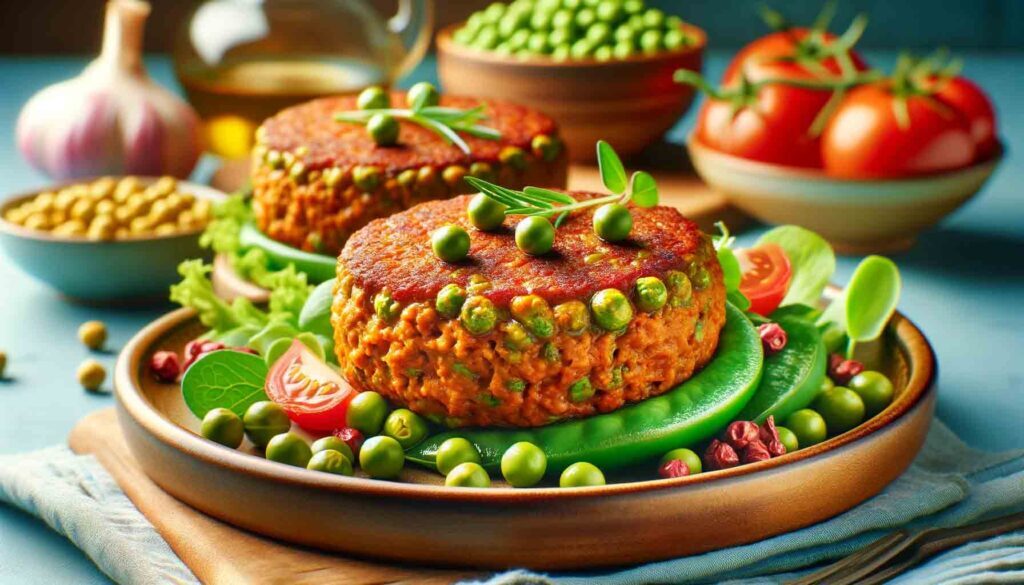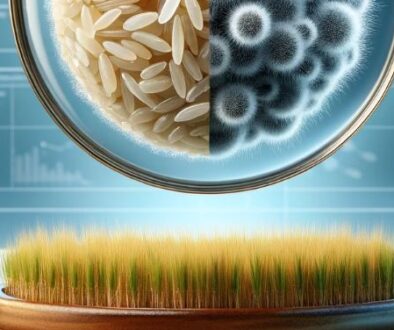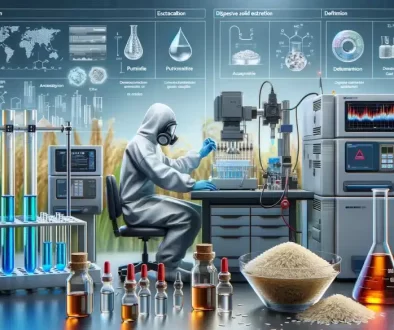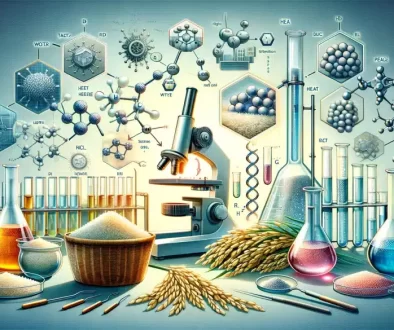Transform Your Meals: Master the Art of Pea Protein Vegan Meat
Unlock the secrets of creating mouth-watering pea protein vegan meat with our easy-to-follow guide. Perfect for vegans and health-conscious foodies, discover how pea protein can revolutionize your cooking!
Introduction
In recent years, there has been a notable shift in dietary preferences towards plant-based diets. This surge in popularity is driven by a growing awareness of health, environmental, and ethical concerns associated with traditional animal-based diets. People around the world are increasingly embracing plant-based foods not only as a means to improve personal health but also as a step towards more sustainable and humane food choices.
Amidst this plant-based revolution, pea protein has emerged as a standout ingredient. Known for its sustainability and impressive nutritional profile, pea protein offers a viable alternative to traditional meat products. Unlike some other plant-based proteins, pea protein is hypoallergenic and boasts a high protein content, making it especially appealing to a broad range of consumers, including those with specific dietary restrictions.
This article aims to delve into the world of pea protein vegan meat. We will explore its myriad benefits, ranging from its nutritional value to its minimal environmental impact. Additionally, the article will provide insights into the preparation methods that make pea protein a versatile ingredient in various culinary creations. By understanding the scope and potential of pea protein, readers can appreciate why it stands out in the ever-growing landscape of plant-based foods and how it is reshaping the future of sustainable eating.
What is Pea Protein Vegan Meat?
Pea protein vegan meat is an innovative plant-based food product designed to mimic the texture and flavor of meat using protein extracted from peas. Unlike traditional meat products derived from animals, pea protein vegan meat offers a sustainable, environmentally friendly, and cruelty-free alternative, catering to the growing demand for vegan and vegetarian options.
The foundation of pea protein vegan meat is pea protein isolate, a highly concentrated protein product derived from yellow and green peas. The process of making pea protein isolate involves several steps. First, peas are dried and ground into fine flour. This flour contains not just protein, but also fibers, starches, and other components. The flour is then mixed with water, and the solution is processed to remove most of the fiber and starch. This step is crucial as it concentrates the protein content. The remaining liquid, which is rich in protein, is then dried, resulting in pea protein isolate. This isolate is a powder that is high in protein yet low in carbohydrates and fats, making it an excellent base for vegan meat alternatives.
When compared to other plant-based protein sources, such as soy or wheat gluten, pea protein stands out for several reasons. Firstly, it is hypoallergenic, making it a suitable option for individuals with allergies to soy, nuts, or gluten. In terms of nutrition, pea protein is a complete protein, meaning it contains all nine essential amino acids necessary for human health. This is relatively rare in plant-based protein sources. Additionally, pea protein has a lower environmental impact than animal-based proteins and some plant-based options like soy, which often require more resources in terms of land and water for production.
In summary, pea protein vegan meat represents a significant advancement in the field of plant-based nutrition. Its production process, nutritional profile, and environmental benefits make it an attractive alternative to traditional meat and other plant-based proteins, aligning with the dietary needs and ethical values of modern consumers.
Pea Protein Vegan Meat Benefits
- Nutritional Value: Pea protein vegan meat is a powerhouse of nutrients. It’s an excellent source of high-quality, plant-based protein, making it ideal for vegetarians, vegans, or anyone looking to reduce their meat consumption. Rich in essential amino acids, it supports muscle growth, repair, and overall health. Additionally, pea protein benefits is often enriched with vitamins and minerals, enhancing its pea protein nutritional profile.
- Environmental Sustainability: Opting for pea protein vegan meat is a step towards environmental sustainability. Peas require less water and land to grow compared to animal farming, significantly reducing the ecological footprint. Peas also fix nitrogen in the soil, improving soil health and reducing the need for synthetic fertilizers, which is beneficial for sustainable agriculture practices.
- Heart Health: Regular consumption of pea protein vegan meat can contribute positively to heart health. Peas are naturally low in fat and cholesterol-free, making them a heart-friendly alternative to traditional meats. The presence of soluble fiber in peas helps in managing cholesterol levels, further promoting cardiovascular health.
- Digestive Health: Peas are a good source of fiber, which is essential for a healthy digestive system. Fiber aids in digestion and helps prevent constipation. Additionally, pea protein is often easier to digest compared to other plant-based proteins, making it a suitable option for people with sensitive stomachs or digestive issues.
- Hypoallergenic: Pea protein has no allergen (hypoallergenic, making it a great alternative for people with common food allergies or intolerances, such as soy, gluten, or dairy. This inclusivity allows more people to enjoy the benefits of a protein-rich diet without the worry of allergic reactions.
- Weight Management: Incorporating pea protein vegan meat into your diet can aid in weight management. Its high protein content can increase feelings of fullness, reducing the likelihood of overeating. This can be particularly beneficial for those looking to lose weight or maintain a healthy weight.
- Versatility in Cooking: Pea protein vegan meat’s neutral flavor and adaptable texture make it a versatile cooking ingredient in the kitchen. It can be used in a variety of recipes, from burgers to stir-fries,from drink to smoothies or shakes, and can easily be flavored to suit different cuisines and taste preferences.
From study and research, pea protein vegan meat offers a multitude of benefits, from its rich nutritional value to its environmental sustainability, making it an excellent choice for health-conscious and eco-friendly consumers alike.
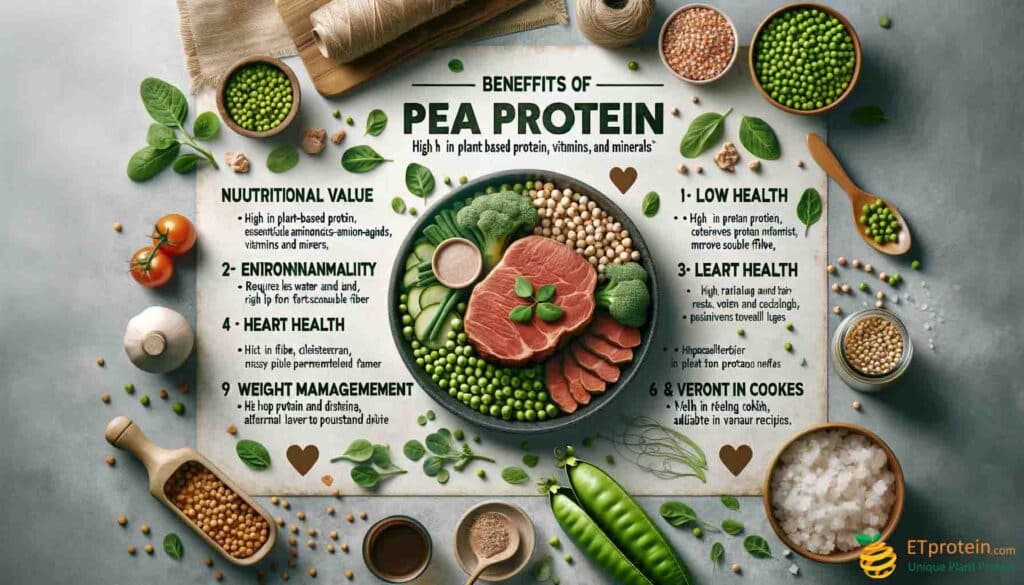
Creating Delicious Pea Protein Vegan Meat: A Step-by-Step Guide
Embrace the world of plant-based cooking with this fantastic pea protein vegan meat recipe. Ideal for vegans, vegetarians, or anyone looking to add more plant-based options to their diet, this pea protein vegan meat is not just healthy but also incredibly delicious.
Ingredients for Your Pea Protein Vegan Meat:
- Pea Protein Isolate: 1 cup (approx. 100g) – the foundation of your pea protein vegan meat.
- Water: 1.5 cups – to hydrate the pea protein isolate for the perfect pea protein vegan meat texture.
- Oil: 2 tablespoons (olive or canola) – to bring richness to your pea protein vegan meat.
- Seasonings: 1 teaspoon each of garlic powder, onion powder, and smoked paprika – to customize your pea protein vegan meat.
- Soy Sauce or Tamari: 2 tablespoons – for that umami depth in your pea protein vegan meat.
- Nutritional Yeast (optional): 1 tablespoon – adds a cheesy flavor to your pea protein vegan meat.
- Vital Wheat Gluten (optional): ½ cup – for a chewier pea protein vegan meat texture.
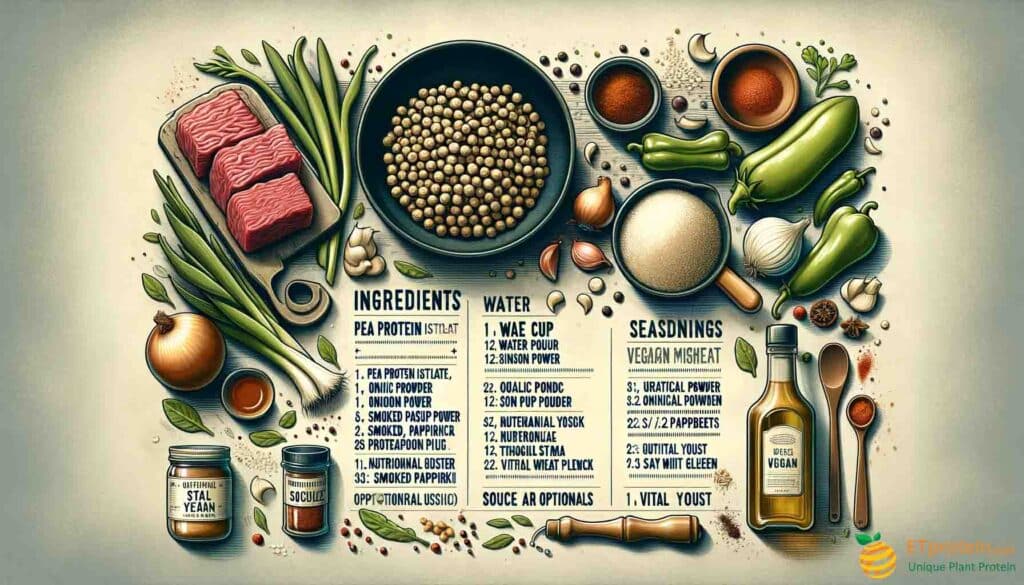
Making Your Pea Protein Vegan Meat:
- Hydration: Mix pea protein isolate with water to start your pea protein vegan meat.
- Seasoning: Flavor your pea protein vegan meat with spices and soy sauce.
- Kneading: Develop the texture of your pea protein vegan meat through kneading.
- Cooking Methods: Boil, steam, or bake your pea protein vegan meat for varied textures.
- Resting: Let your pea protein vegan meat sit to enhance flavor and texture.
- Final Cooking: Fry or grill your pea protein vegan meat as desired.
Here is a table outlining the steps for making pea protein vegan meat:
| Step | Description |
|---|---|
| 1. Hydration | Mix pea protein isolate with water to start your pea protein vegan meat. |
| 2. Seasoning | Flavor your pea protein vegan meat with spices and soy sauce. |
| 3. Kneading | Develop the texture of your pea protein vegan meat through kneading. |
| 4. Cooking Methods | Boil, steam, or bake your pea protein vegan meat for varied textures. |
| 5. Resting | Let your pea protein vegan meat sit to enhance flavor and texture. |
| 6. Final Cooking | Fry or grill your pea protein vegan meat as desired. |
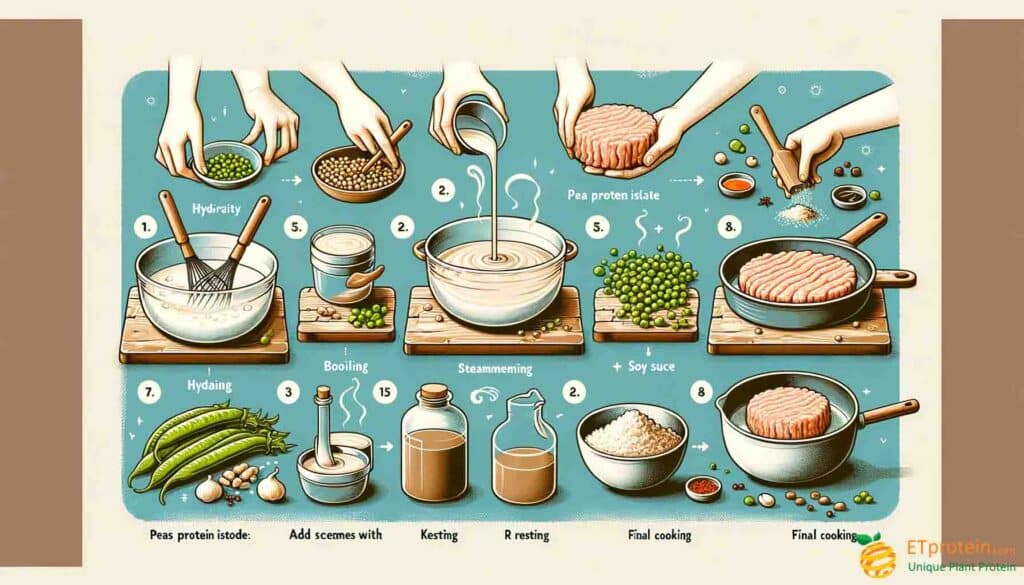
Why Choose Pea Protein
- Nutrient-Rich and Healthy:
- Pea protein is an excellent source of plant-based protein, making it a top choice for a nutritious diet. It’s especially beneficial for those following a vegan lifestyle, as it provides essential amino acids typically found in animal proteins. The high protein content in pea protein vegan meat makes it a healthy and nourishing option for meal planning.
- Versatile in Cooking:
- One of the standout features of pea protein vegan meat is its versatility in the kitchen. It can easily adapt to a wide range of recipes, making it a perfect ingredient for creative cooking. Whether you’re grilling, frying, or baking, pea protein vegan meat can be seasoned and cooked in various ways to suit any palate. Its ability to absorb flavors makes it ideal for experimenting with different cuisines and dishes.
- Allergy-Friendly and Inclusive:
- For individuals with food allergies or sensitivities, pea protein vegan meat is a fantastic alternative. It’s a safe option for those who are allergic to common allergens like soy or gluten. By omitting wheat gluten, pea protein becomes an inclusive food choice, allowing those with gluten sensitivities to enjoy a wider variety of meals. This makes it not only a nutritious choice but also a considerate option for diverse dietary needs.
Pea Protein Vegan Meat Tips:
- Texture Play:
- To achieve the perfect texture in pea protein vegan meat, the key is to play around with hydration and kneading. Start by hydrating the pea protein with the right amount of liquid—usually water or vegetable broth. The liquid helps the protein expand and soften, creating a more meat-like texture. Kneading is also crucial. Spend a few minutes kneading the hydrated pea protein. This process helps develop the gluten (if present), which can create a chewier, more satisfying texture. For those who prefer a firmer texture, consider adding ingredients like cooked rice or mushrooms, which can give a more substantial bite to the final product.
- Flavor Experiments:
- The right seasoning can elevate your pea protein vegan meat from good to great. Begin with a base of salt and pepper, then build layers of flavor. Think about the final dish you’re aiming for and season accordingly. If you’re making a vegan burger, try adding smoked paprika for a BBQ-like flavor, or for an Asian-inspired dish, incorporate soy sauce, ginger, and garlic. Don’t shy away from marinating your pea protein vegan meat. A good marinade can infuse deep flavors and also aid in tenderizing the protein. For a more complex flavor profile, experiment with different herbs and spices, like cumin, coriander, or even a touch of cinnamon. Remember, the mild nature of pea protein makes it a blank canvas for your culinary creativity.
Additionally, consider the cooking method as a part of your flavor strategy. Grilling can impart a smoky flavor, while sautéing with olive oil can bring out a richer taste. Combining cooking methods can also create interesting textures and flavors, like searing for a crispy outer layer and then baking for a tender inside.
By focusing on texture and flavor, you can transform pea protein vegan meat into a delicious and satisfying component of your meals. These tips can help you tailor the pea protein to fit a variety of dishes, making it a versatile and enjoyable part of your plant-based diet.
Health Considerations
Pea protein vegan meat offers numerous health benefits, making it a nutritious choice for a variety of diets:
- Heart Health:
- Naturally cholesterol-free and low in fat.
- Helps maintain a healthy cardiovascular system.
- Can contribute to lower cholesterol levels and reduced heart disease risk.
- Weight Management:
- High in protein and low in calories.
- Promotes feelings of fullness and satiety, aiding in weight control.
- Suitable for weight loss or maintenance diets.
- Muscle Building:
- Rich in essential amino acids needed for muscle growth and repair.
- Beneficial for athletes and fitness enthusiasts.
- Addressing Dietary Concerns:
- Hypoallergenic, ideal for those with allergies to soy or nuts.
- Often easier to digest compared to other plant-based proteins.
- Suitable for Special Diets:
- Gluten-free and soy-free, perfect for people with gluten intolerance or soy allergies.
- Inclusive, allowing broader access to high-quality plant-based protein.
Pea protein vegan meat is not just a meat alternative; it’s a healthful option that caters to heart health, weight management, muscle building, and various dietary needs, including special diets like gluten-free and soy-free.
Consumer Trends and Market Analysis
The market for pea protein vegan meat is rapidly expanding, reflecting changing consumer preferences and broader food industry trends:
- Growing Market for Pea Protein:
- Significant growth in demand for plant-based meat alternatives.
- Increasing availability in supermarkets, restaurants, and specialty stores.
- Expansion driven by consumer health consciousness and environmental concerns.
- Consumer Trends:
- Rise in flexitarian, vegetarian, and vegan lifestyles.
- Growing awareness of the health benefits associated with plant-based diets.
- Concerns about animal welfare and the environmental impact of meat production.
- Preference for clean-label products with fewer additives.
- Future Predictions:
- Expected continued growth in the plant-based protein sector.
- Innovation in product development, leading to improved taste and texture.
- Potential mainstream adoption as a staple in regular diets.
- Increased investment and interest from major food industry players.
The market dynamics of pea protein vegan meat are shaped by evolving consumer preferences, with a strong inclination towards health, sustainability, and ethical considerations. The future of plant-based proteins in the food industry looks promising, with pea protein poised to play a significant role.
Future Predictions of Pea Protein Vegan Meat
The study shows that the future of the plant-based protein sector, particularly pea protein vegan meat, appears bright and dynamic, characterized by several key trends:
- Continued Growth in Plant-Based Proteins:
- Steady increase in demand for plant-based protein products.
- Greater consumer awareness and preference for sustainable, health-conscious food options.
- Expansion of plant-based diets beyond vegan and vegetarian communities to include flexitarians.
- Innovation in Product Development:
- Ongoing research and development to enhance the taste and texture of pea protein products.
- Integration of new technologies to replicate the sensory experience of traditional meat.
- Focus on improving nutritional profiles while maintaining appealing flavors.
- Mainstream Adoption:
- Pea protein vegan meat becoming a regular feature in diverse dietary plans.
- Shift from being a niche product to a widely accepted alternative in standard diets.
- Increased availability in everyday food outlets, including fast-food chains and school cafeterias.
- Increased Investment and Interest:
- Growing interest and investment from major players in the food industry.
- Collaborations between startups and established companies to expand product ranges.
- Enhanced marketing efforts to reach a broader audience and encourage widespread adoption.
These predictions underscore the potential of pea protein vegan meat not only as an alternative protein source but as a mainstream food choice, reflecting changing consumer preferences and the evolving landscape of the food industry.
Why ETprotein’s Pea Protein is the Best Choice:
For the best results in your pea protein vegan meat recipe, we highly recommend using ETprotein’s Pea Protein. It is non-GMO, allergen free, Europe Organic and NOP Organic certified. Its superior quality and pure composition ensure that your vegan meat has an excellent texture and flavor. ETprotein’s Pea Protein is known for its high protein content, minimal flavor interference, and ease of use in recipes, making it the perfect choice for this culinary creation.
Enjoy your culinary journey with pea protein vegan meat – your ticket to delicious, healthy meals!
About ETprotein:
ETprotein, a reputable pea protein Chinese factory manufacturer and supplier, is renowned for producing, stocking, exporting, and delivering the highest quality organic bulk vegan protein and plant proteins. They include rice protein, clear rice protein, pea protein, clear pea protein, pumpkin seed protein, sunflower seed protein, mung bean protein, etc. Our offerings, characterized by a neutral taste, non-GMO, allergen-free attributes, cater to a diverse range of industries. We serve nutraceutical, pharmaceutical, cosmeceutical, veterinary, as well as food and beverage finished product distributors, traders, and manufacturers across Europe, USA, Canada, Australia, Thailand, Japan, Korea, Brazil, and Chile, among others.
Our specialization includes exporting and delivering tailor-made protein powder and finished nutritional supplements. Our extensive product range covers sectors like Food and Beverage, Sports Nutrition, Weight Management, Dietary Supplements, Health and Wellness Products, and Infant Formula, ensuring comprehensive solutions to meet all your protein needs.
As a trusted company by leading global food and beverage brands and Fortune 500 companies, ETprotein reinforces China’s reputation in the global arena. For more information or to sample our products, please contact us and email sales(at)ETprotein.com today.

